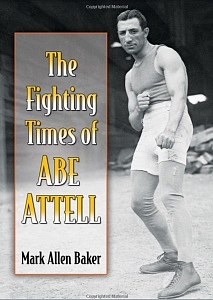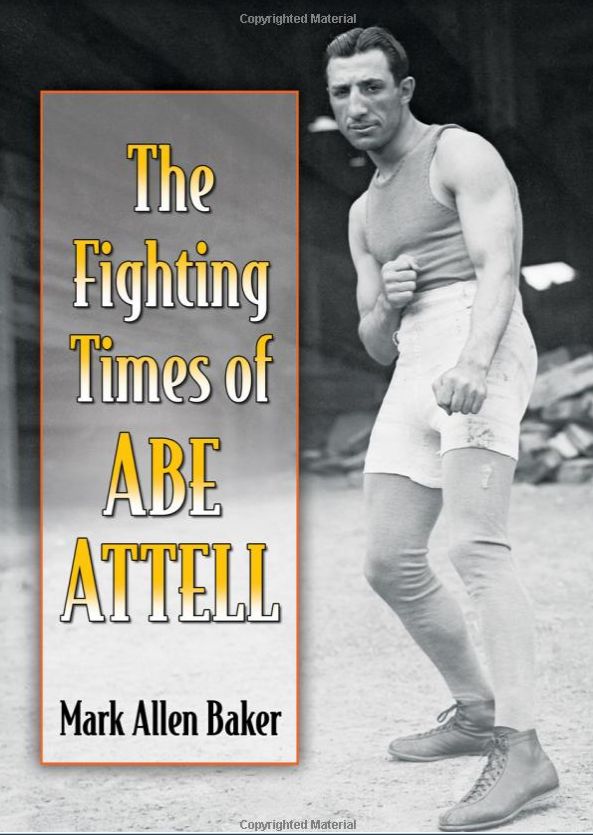MARK ALLEN BAKER DISCUSSES HIS BIOGRAPHY OF “THE LITTLE CHAMP”
by Roger Zotti
“[Abe] Attell was one of the most remarkable featherweights that ever stepped under a rope.” 
Quoted by Mark Allen Baker from the New York Evening Journal
1
As a Jew growing up poor in an Irish neighborhood in San Francisco, Abraham Washington Attell (1883-1970) “faced his share of adversity and anti-Semitism,” Mark Allen Baker points out in his biography The Fighting Times of Abe Attell.
Standing 5 feet 4 and nicknamed “The Little Champ” and “The Little Hebrew,” Attell began boxing professionally in 1900. A scientific fighter, he won the world featherweight championship in 1906 and dominated the division until 1912. When he retired his record was a terrific 91 Wins, 9 Losses, 18 Draws, 51 No Decisions, and 2 No Contests.
In 1990 he was inducted into the International Boxing Hall of Fame, located in Canastota, New York.
2
Roger Zotti: Mark, what prompted you to write a book about Attell?
Mark Baker: Noting that Abe Attell, a great fighter yet a rather mysterious figure, has no biography, I believed it was time for that to change. His tremendous ring career was being ignored and replaced by stories of his indiscretions, one in particular; consequently, The Fighting Times of Abe Attell fills that void. Again, the book broke new ground.
He was among the cleverest boxers ever to enter the ring. He fought over 170 times, defending his title over 15 times, defeating challengers such as Johnny Kilbane, Ad Wolgast, and Battling Nelson.
His success inspired his brothers Caesar and Monte to take up boxing—Abe and Monte held simultaneous world titles for a time.
RZ: What do you hope readers take from your book?
MB: If every reader discovers Abe Attell as a brilliant boxer and one of the finest featherweights ever, then I have done my job. The Attell family, a genuine boxing clan, deserves far more credit than they have been granted. I hope this book, along with the others that will no doubt follow, enhance his legacy.
RZ: I’m going to focus on two highlight chapters, in a book of highlight chapters: “Losing the Title, 1912” and “The Black Sox Scandal of 1919, 1919-1921” . . . So, on February 22, 1912, the date Attell fought Johnny Kilbane in Vernon, California, the featherweight title changed hands after twenty rounds of boxing. Kilbane proved he was the better man. As you point out, he “had systemically taken nearly every round.”
Less than a month later Attell was back in the ring, this time against tough Tommy Murphy and you write, “The final two rounds turned the fight toward Murphy.”
On August 3, in San Francisco and under new manager Billy Nolan, Attell’s rematch with Murphy was a draw. So, was the former featherweight ruler back in form? Probably not, because on September 13, at New York’s Madison Square Garden, he fought England’s Harry Thomas, and his showing wasn’t impressive. “Both fighters,” you write, “appeared to be relieved when the ten-round no-decision concluded.”
Then, in St. Louis, on November 27, Attell mixed it up with Olympic Gold Medal winner Oliver Kirk, who had a professional record of 2-1-1. “At the end of the sixth round, according to the Evening Standard, which you quote, Attell “‘stepped to the ropes and announced that he had enough . . . that he was now through with the fight game forever.’”
Some facts about Attell:
- On December 15 Attell recants. “‘I’m still in the game,’” you quote him as telling reporters.
- On March 19, 1913, he’s back in the ring against Oliver Kirk again, stopping him in three rounds. That year, in addition to fighting two no decisions and one no contest, he registers three wins.
- He’s inactive in 1914, fights once in 1915, and is inactive again in 1916.
- In New Orleans on January 8, 1917, Phil Virgets stops him in four rounds. You quote the Evening Farmer as saying: “The fact of the matter is that Father Time licked Abe, and not Virgets.”
- The Virgets fight is Attell’s 171st – and also his last.
That said, let’s move to the chapter about the Black Sox scandal during the World Series against Cincinnati.
MB: A subject’s indiscretions are always difficult to write about. Attell was prone to imprudence in the form of gambling. The highlight of which was his involvement in the 1919 Black Sox Scandal . . . The impropriety was a Major League Baseball game fixing incident in which eight members of the Chicago White Sox were accused of Intentionally losing the 1919 World Series against the Cincinnati Reds in exchange for money from a gambling syndicate led by Arnold Rothstein. The fallout from the scandal resulted in the appointment of Judge Kenesaw Mountain Landis as the first commissioner of baseball granting him absolute control over the game in order to restore its integrity.
Over the years Attell’s involvement has been exaggerated beyond belief. The story has been so Contaminated that few understand what happened. If you were to go back in time and read about the scandal in the newspapers, it would be exactly what I presented in the book. The layman’s approach, if you will, presents the case chronologically as it unfolded in the press. It is a version that has been lost. Rather than spending the entire book defending 91 days of Abe Attell’s life, I chose to expound on his tremendous boxing career and the life of a fascinating individual.
RZ: I didn’t know much about Attell as a fighter and his alleged involvement in the scandal before reading your book. What I learned came from books and movies and focused on Chicago outfielder Shoeless Joe Jackson, whom Landis banned from the game. The movies were Eight Men Out and Field of Dreams, which you mention in your book, and the novel was W.P. Kinsella’s Shoeless Joe.
Just how good was Jackson? Well, in a recent book about Ty Cobb by Charles Leerhsen, Ty Cobb: A Terrible Beauty, the author writes about a reunion between Cobb and Jackson. “’Whenever I got the idea that I was a good hitter I’d stop and take a good look at you,’ Cobb said. ‘Then I knew I could stand some improvement.’”
I digress. Mark, any last words for our readers?
MB: Well, having written over twenty books, I am grateful for the opportunity to write about the sport we all love. My twenty-first book is complete and will be coming out in the spring of 2019, and I am currently working on my twenty-second book. Both titles are about boxing. Working around the clock has enabled me to dedicate fulltime to my research. I can’t begin to tell you how thankful I am to everyone who supports my work. I am delighted to call many IBRO members not only my friends, but individuals who have inspired me to write. Thank you so much for allowing me this forum.
3
A smartly written first ever biography, Mark Allen Baker’s book is a solid achievement. A master of detail, his research is extensive and filled with fascinating facts not only about Attell’s lengthy career and life but insights about the Roaring Twenties, California history in the early nineteen-hundreds, the Depression, and even a bit about the nineteen fifties and sixties. Also, there are many striking images of Attell and other individuals in his life.
This book is available on Amazon.Com
A regular contributor to the IBRO Journal , Roger Zotti is the author of two books about boxing (Friday Night World and The Proper Pugilist). Contact him at rogerzotti@aol.com for more information about his books.
